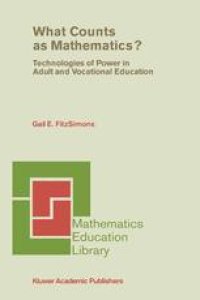
Ebook: What Counts as Mathematics?: Technologies of Power in Adult and Vocational Education
Author: Gail E. Fitzsimons (auth.)
- Tags: Mathematics Education, Professional & Vocational Education, Education & Society
- Series: Mathematics Education Library 28
- Year: 2002
- Publisher: Springer Netherlands
- Edition: 1
- Language: English
- pdf
JÜRGEN MAASS & WOLFGANG SCHLÖGLMANN THEORY AND PRACTICE OF MATHEMATICS EDUCATION FOR ADULTS Our world is dominated by technological developments: The philosopher Heinz Hülsmann wrote that “Atom, Gen and Bit” are the three basic principles now (see Hülsmann, 1985). Each of the so-called new technologies is based upon mathematics: The first computer was built as a part of the Manhattan Project to calculate models of the atomic bomb. The human genome project uses computers very often to find out the structure of the genome. And computers are mathematical machines, materialised mathematics. Social organisations, companies, and not least governments use computers to process information. A precondition for this is to formalise the social or economical structure which “produces” the information. This formalisation is a type of mathematisation, too. The social and economical models of organisations or companies are a part of the process of mathematising the world. Last, but not least, mathematics is a part of everyday life and work. People handle money, buy things, do handywork at home (measure areas to paint, and so on). All together, mathematics is not only the basis for technology, economy, work and everyday life, but a part of our culture. It seems clear that everyone in our society should know more about this.